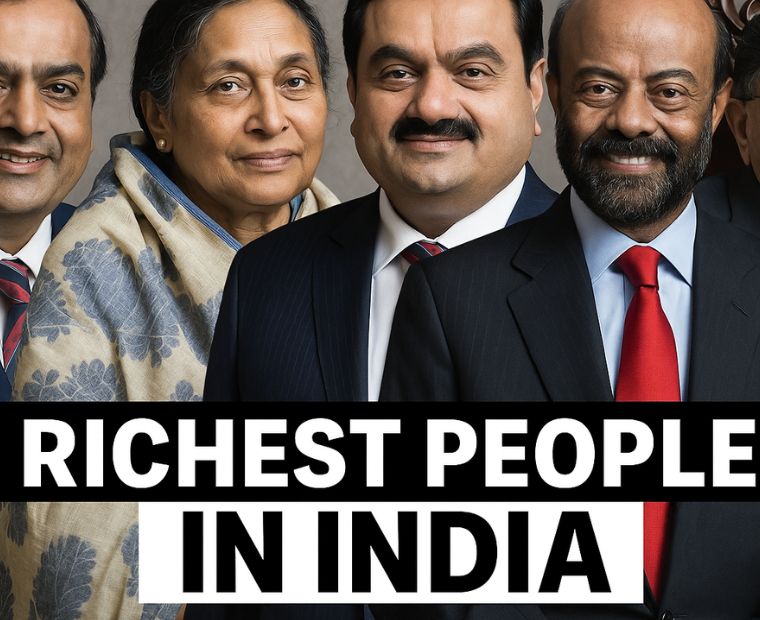
Table of Contents
Modified On:
Are you looking to get rich in India? Here are 7 practical tips and book suggestions to help you upskill and achieve your financial goals.
In a land where rags-to-riches stories have been etched into the annals of history, the journey to wealth is not merely a solitary pursuit but a collective endeavor fueled by ambition and hard work.
Starting from the Ambanis, India has a long history of individuals rising from humble beginnings to attain significant wealth.
If you've ever wondered how to tap into India's vast economic potential and build a life of financial prosperity, then you're in the right place.
This article will show you how to become rich in India.
Step 1 - Find What’s Wealth To You
In order to find out how to get rich, find out what wealth means to you.
Richness is a subjective concept. It varies from person to person. To embark on the journey to wealth, start by defining what "rich" means to you.
Set specific financial goals aligned with your aspirations. You should embark on this journey by finding answers to critical questions like- when do you want to retire? What’s your post-retirement plan? Do you wish to start a family? Do you plan to invest?
Answers to such questions will help you find your definition of wealth.
Step 2 - The Debt Avalanche Method
Not all debt is equal, and if you aim to accumulate wealth, high-interest debt can be a major obstacle if you want to know how to become rich in India.
Part of your wealth-building strategy should include a plan to eliminate bad debt while managing responsible levels of good debt, like a mortgage. The debt avalanche method is a powerful tool to help you tackle high-interest debt efficiently.
With this approach, direct the maximum available funds toward your highest interest rate debt while making only minimum payments on other debts. Once you've cleared the high-interest debt, roll over the amount you were paying into the next highest-interest-rate debt.
While it may be tempting to pay off lower-interest-rate debts like student loans or your mortgage first, tackling the high-interest debt initially will save you more in the long run.
Step 3 - Build Your Emergency Fund
An emergency fund is a fundamental element of your path to know how to become rich in India.
It's not your investment portfolio or assets like Bitcoin or stocks; instead, it's a pool of easily accessible cash stashed in a low-risk savings account. This fund acts as a financial safety net, protecting you from accumulating high-interest debt during unexpected financial emergencies.
Many experts recommend an emergency fund covering three to six months of your expenses, but the ideal amount may vary based on your circumstances.
Build your emergency fund and keep it in a savings account that earns a competitive Annual Percentage Yield (APY). Don't forget to replenish it after you dip into it.
Step 4 - The Power of Early Investing
When you're young, you have the luxury of taking more risks in your investments, thereby increasing your chances on how to become rich in India.
Your financial responsibilities are typically lower, and you can afford to allocate a larger portion of your portfolio to risky assets, such as equities. This is because if things don't go as planned, you have more time to recover and adjust your strategy.
One of the most significant benefits of early investing is the magic of compounding. Let's try to understand what compounding is by observing two cases.
Case 1: You start investing in an equity mutual fund at the age of 25. You save Rs 6,000 every month until the age of 60. In 35 years, your total investment is Rs 25.2 lakh, and you aim to accumulate Rs 4 crore for retirement.
Case 2: You delay your investment by 15 years and start at 40. You still aim for Rs 4 crore, but now you need to save Rs 40,000 per month. The total investment over 20 years amounts to Rs 96 lakh.
The difference is striking. By delaying your investment by 15 years, your monthly investment amount increases over six times, and your total investment is four times higher. Compounding works in your favor when you start early, enabling you to accumulate a much larger corpus.
Step 5 - Seeking Income-Earning Opportunities
Research and find additional avenues for generating income beyond your primary income source.
This could involve starting a side hustle, freelance work, or investing.
The extra income can be used to accelerate saving, investing, and achieving your financial goals faster.
- Freelancing : Leverage your skills and experience to offer freelance services online or locally, such as writing, editing, graphic design, web development, or virtual assistance.
- Side hustles : Explore entrepreneurial ventures like starting a small business, online store, or offering services like food delivery or pet care.
- Renting assets : Monetize your unused assets like cars, parking spaces, or even your home through platforms like Airbnb or Uber.
- Investing in income-generating assets : Consider investing in rental properties, royalty-generating assets like music or writing, or peer-to-peer lending platforms.
Capitalise on digital opportunities:
- Content creation : Establish yourself as an influencer, blogger, or YouTuber through relevant social media platforms.
- Online learning : Share your knowledge and expertise by creating and selling online courses or tutorials.
- Affiliate marketing : Promote products or services online and earn commissions on sales generated through your referrals.
- Micro-tasking platforms : Complete online tasks like data entry, transcription, or surveys to earn additional income.
Remember, the key is to be creative, resourceful, and adaptable. The possibilities for generating additional income are vast, so explore what aligns with your skills, interests, and available time.
Step 6 - Upskilling
Upskilling yourself in the field of personal finance is important because it can help you make better financial decisions and achieve your financial goals. When you have a good understanding of financial education, you can better manage your money, invest wisely, and plan for your future.
This can lead to a more secure and comfortable financial future.
There are many ways to upskill yourself in personal finance. You can read books and articles, take online courses, or attend financial workshops. You can also talk to a financial advisor to get personalized advice. Here are some of the best book suggestions to upskill yourslef.
1. Rich Dad Poor Dad by Robert Kiyosaki
"Rich Dad Poor Dad" is a financial classic that offers invaluable lessons about money.
By sharing the contrasting stories of two fathers, one educated but struggling financially and the other a successful dropout; the book highlights essential financial principles. It encourages readers to think like the school dropout "rich dad" and take control of their financial future.
This book is a must-read for anyone looking to gain a better understanding of personal finance and take actionable steps toward financial success.
2. The Millionaire Next Door by Thomas Stanley and William Danko
"The Millionaire Next Door" provides insight into the habits of everyday millionaires who have accumulated wealth without attracting attention.
It emphasizes that many wealthy individuals live frugally, save consistently, and invest wisely.
This book is an excellent choice for those who want to learn how to build wealth steadily and maintain financial discipline. It offers practical advice on how to grow your net worth without extravagant spending.
3. The Science of Getting Rich by Wallace Wattles
Despite the book's title, "The Science of Getting Rich" is not a scientific manual but a classic self-help guide on accumulating wealth.
It suggests that your mindset and beliefs about money play a significant role in your financial success. If you're looking to reshape your attitude toward wealth and understand how your thoughts can impact your financial journey, this book is a thought-provoking choice.
4. Financial Feminist by Tori Dunlap
"Financial Feminist" by Tori Dunlap is a book that empowers women to advocate for their financial worth and make informed financial decisions.
It offers a practical financial plan for building a fulfilling career while achieving financial stability. This book is particularly suitable for socially conscious millennial women and young professionals who want to take control of their financial futures.
5. The Richest Man in Babylon by George S. Clason
"The Richest Man in Babylon" provides timeless financial advice through a series of parables.
It emphasizes the importance of saving, investing, and giving. If you're looking for straightforward yet powerful financial principles, this book offers practical insights into how to grow your wealth and maintain financial integrity.
6. Think and Grow Rich by Napoleon Hill
"Think and Grow Rich" is a classic in the realm of personal development and wealth creation.
It is based on interviews with successful individuals, including Andrew Carnegie. The book encourages the idea that wealth creation is not at odds with moral values and highlights the importance of sharing wealth.
If you seek to align your financial goals with principles of integrity and personal development, this book provides valuable guidance on achieving both financial success and personal growth.
Step 7 - Leveraging Government Schemes:
India offers various government schemes and initiatives designed to promote financial inclusion and wealth creation.
Explore schemes like Pradhan Mantri Awas Yojana for housing, Atal Pension Yojana for retirement planning, and Sukanya Samriddhi Yojana for girl child education.
These schemes offer attractive benefits and tax advantages, further boosting your financial journey.
Identify schemes that align with your goals:
- Consider your financial goals and needs when choosing which schemes to participate in.
- Analyze the eligibility criteria and the benefits offered by each scheme.
- Calculate the potential returns and compare them to other investment options.
- Consult with government officials or financial advisors for personalized guidance on choosing and applying for schemes.
- Utilize online resources and government websites for information and assistance.
- Join support groups or forums for scheme beneficiaries to learn from their experiences and tips.
Explore and understand available schemes:
- Pradhan Mantri Awas Yojana (PMAY): This scheme offers financial assistance for affordable housing to eligible beneficiaries.
- Atal Pension Yojana (APY): This scheme provides guaranteed minimum monthly pension after retirement.
- Sukanya Samriddhi Yojana (SSY): This scheme provides a high-interest rate account for girl children, promoting their financial security.
- Public Provident Fund (PPF): This scheme offers a long-term investment option with attractive guaranteed returns and tax benefits.
- Senior Citizen Savings Scheme (SCSS): This scheme offers a high-interest rate account specifically for senior citizens.
Government schemes can be a valuable tool for accelerating your wealth creation journey.
By understanding the available options, selecting the right ones for your goals, and utilizing them effectively, you can significantly improve your financial well-being.

Save Money in Digital Gold

.svg)








.png)
.png)











.jpg)


